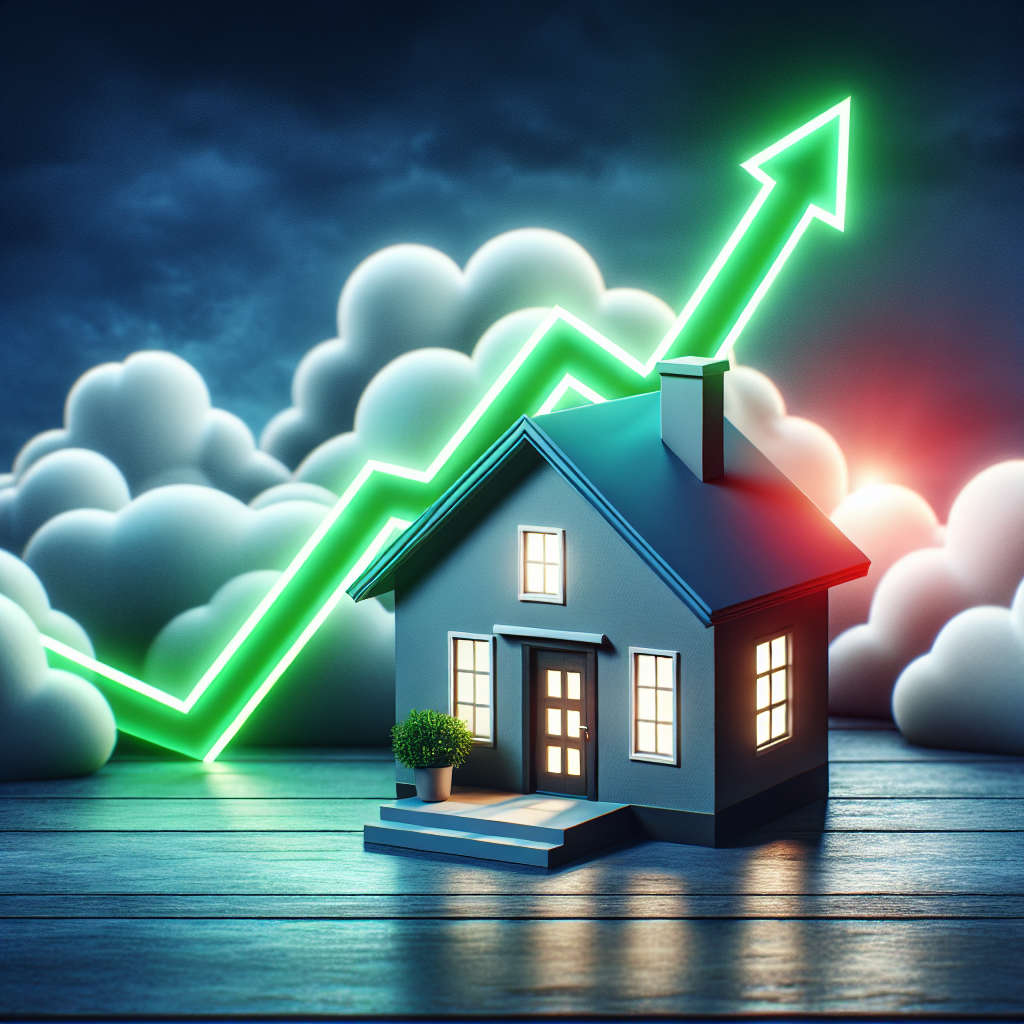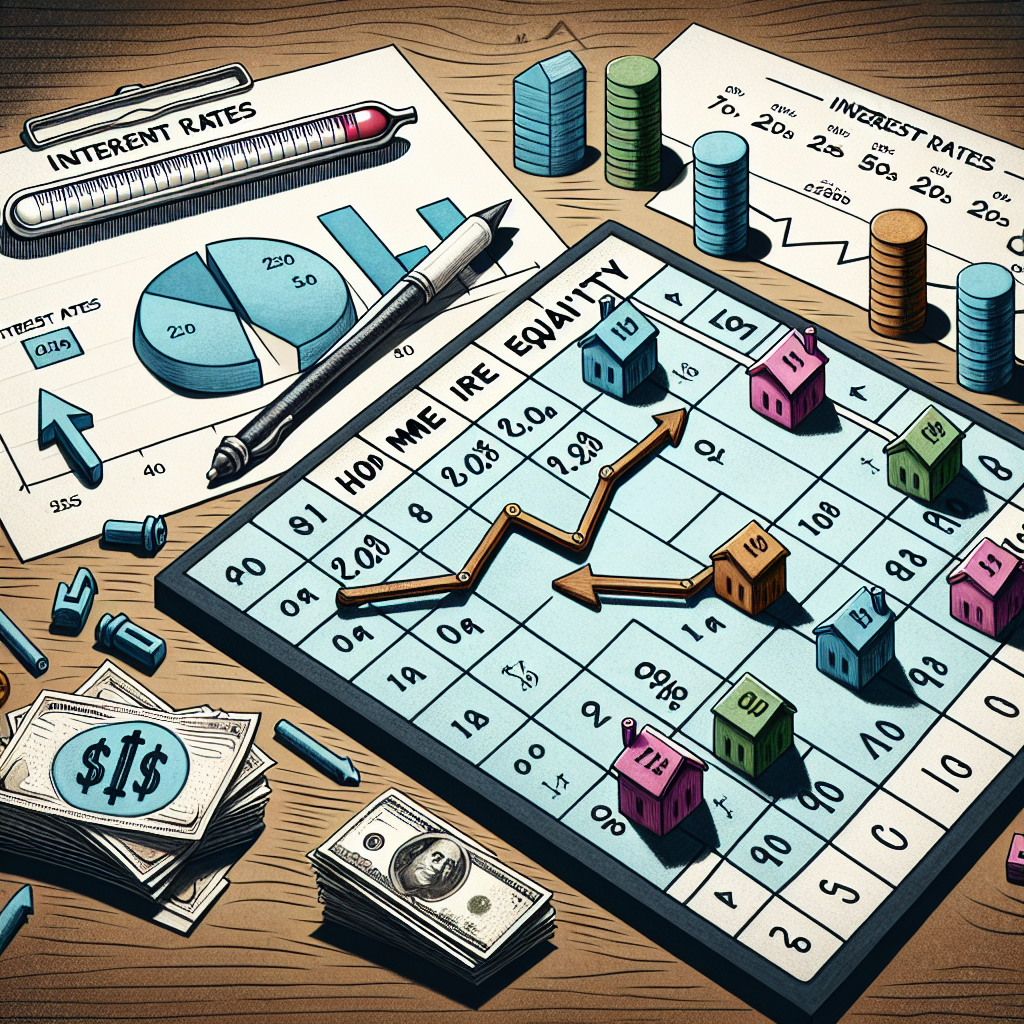-
Table of Contents
- Record-High Home Equity Faces Challenges Amid Rising Interest Rates
- Understanding Home Equity
- The Role of Interest Rates in Home Equity
- Impact on Homeowners
- Refinancing Challenges
- Home Equity Loans and HELOCs
- Affordability and Home Prices
- Case Studies: Regional Variations
- Case Study 1: San Francisco Bay Area
- Case Study 2: Midwest Suburbs
- Economic Implications
- Strategies for Homeowners
- Locking in Fixed Rates
- Prioritizing Debt Repayment
- Exploring Alternative Financing Options
- Investing in Home Improvements
- Conclusion
Record-High Home Equity Faces Challenges Amid Rising Interest Rates

In recent years, homeowners in the United States have experienced a significant increase in home equity, driven by a robust housing market and rising property values. However, this record-high home equity is now facing challenges as interest rates begin to climb. This article delves into the dynamics of home equity, the impact of rising interest rates, and the potential implications for homeowners and the broader economy.
Understanding Home Equity
Home equity represents the difference between the market value of a home and the outstanding balance on any mortgages or loans secured by the property. Essentially, it is the portion of the property that the homeowner truly owns. Home equity can be built through:
- Paying down the mortgage principal
- Appreciation in property value
- Home improvements that increase the property’s value
As of 2023, U.S. homeowners collectively hold trillions of dollars in home equity, a figure that has been bolstered by a decade-long surge in home prices. According to CoreLogic, a leading property data and analytics company, the average homeowner gained approximately $55,000 in equity in 2022 alone.
The Role of Interest Rates in Home Equity
Interest rates play a crucial role in the housing market and, by extension, in the accumulation and utilization of home equity. When interest rates are low, borrowing costs are reduced, making it easier for homeowners to refinance their mortgages, take out home equity loans, or secure home equity lines of credit (HELOCs). Conversely, rising interest rates can have several adverse effects:
- Increased borrowing costs
- Reduced affordability for potential homebuyers
- Slower home price appreciation
As the Federal Reserve raises interest rates to combat inflation, homeowners and prospective buyers are beginning to feel the pinch. The average 30-year fixed mortgage rate has climbed from historic lows of around 3% to over 6% in 2023, significantly impacting the housing market.
Impact on Homeowners
Refinancing Challenges
One of the immediate effects of rising interest rates is the reduced incentive for homeowners to refinance their existing mortgages. During periods of low interest rates, refinancing can lower monthly payments, shorten loan terms, or allow homeowners to tap into their home equity for cash. However, with higher rates, the benefits of refinancing diminish, leading to a decline in refinancing activity.
Home Equity Loans and HELOCs
Home equity loans and HELOCs are popular ways for homeowners to access the equity in their homes for various purposes, such as home improvements, debt consolidation, or major purchases. These financial products typically come with variable interest rates, which can become more expensive as overall interest rates rise. Consequently, homeowners may be less inclined to take out these loans, potentially limiting their ability to leverage their home equity.
Affordability and Home Prices
Rising interest rates can also affect housing affordability. Higher mortgage rates increase the cost of borrowing, which can reduce the purchasing power of potential homebuyers. This, in turn, can lead to a slowdown in home price appreciation or even a decline in property values in some markets. For existing homeowners, this means that the rapid equity gains seen in recent years may begin to taper off.
Case Studies: Regional Variations
The impact of rising interest rates on home equity can vary significantly by region. Let’s examine two contrasting case studies:
Case Study 1: San Francisco Bay Area
The San Francisco Bay Area has long been one of the most expensive housing markets in the country. Homeowners in this region have benefited from substantial equity gains due to skyrocketing property values. However, the high cost of living and already elevated home prices mean that rising interest rates could have a pronounced impact on affordability. Potential buyers may find it increasingly difficult to enter the market, leading to a potential slowdown in price appreciation.
Case Study 2: Midwest Suburbs
In contrast, suburban areas in the Midwest, such as those around Indianapolis or Columbus, have seen more moderate home price increases. Homeowners in these regions may be less affected by rising interest rates, as property values are generally more affordable. However, the overall trend of higher borrowing costs could still dampen home equity growth, albeit to a lesser extent than in high-cost coastal markets.
Economic Implications
The interplay between home equity and interest rates has broader economic implications. Home equity is a significant source of wealth for many Americans, and changes in its value can influence consumer behavior and spending patterns. Here are some potential economic impacts:
- Consumer Spending: Homeowners with substantial equity gains may feel more confident in their financial situation and be more likely to spend on goods and services. Conversely, a slowdown in equity growth could lead to more cautious spending.
- Housing Market Activity: Rising interest rates can lead to a cooling of the housing market, with fewer transactions and slower price appreciation. This can affect industries related to real estate, such as construction, home improvement, and mortgage lending.
- Wealth Effect: Changes in home equity can impact the perceived wealth of homeowners. A decline in equity growth may lead to a reduced wealth effect, where homeowners feel less wealthy and are less likely to engage in discretionary spending.
Strategies for Homeowners
In light of rising interest rates and potential challenges to home equity growth, homeowners can consider several strategies to navigate this changing landscape:
Locking in Fixed Rates
For those considering refinancing or taking out a home equity loan, locking in a fixed interest rate can provide stability and predictability in monthly payments. This can be particularly advantageous in a rising rate environment.
Prioritizing Debt Repayment
Homeowners with variable-rate debt, such as HELOCs, may want to prioritize paying down these balances to mitigate the impact of rising interest rates. Reducing overall debt can also improve financial resilience.
Exploring Alternative Financing Options
As traditional home equity loans and HELOCs become more expensive, homeowners can explore alternative financing options, such as personal loans or cash-out refinancing, depending on their financial situation and goals.
Investing in Home Improvements
Investing in home improvements that enhance the property’s value can be a strategic way to build equity. Projects that increase energy efficiency, update key areas like kitchens and bathrooms, or add living space can provide a good return on investment.
Conclusion
Record-high home equity has been a boon for many U.S. homeowners, providing a valuable source of wealth and financial flexibility. However, the landscape is shifting as rising interest rates introduce new challenges. Homeowners must navigate these changes carefully, considering the impact on refinancing, home equity loans, and overall affordability. By adopting prudent financial strategies and staying informed about market trends, homeowners can continue to make the most of their home equity in an evolving economic environment.
In summary, while rising interest rates pose challenges to the growth and utilization of home equity, they also present an opportunity for homeowners to reassess their financial strategies and make informed decisions. By understanding the dynamics at play and taking proactive steps, homeowners can navigate this changing landscape and continue to build and leverage their home equity effectively.








